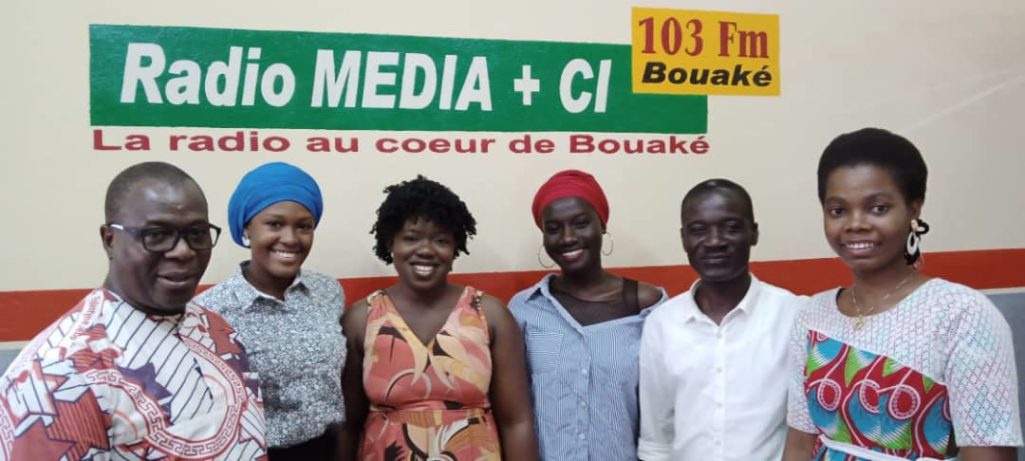Women in leadership is an important theme for International Women’s Day and beyond. It’s also a topic that Radio Média + CI Bouaké in Bouaké, Côte d’Ivoire touches on each week in their Leadership au feminin (Female Leadership) program, which is dedicated to women and attempts to break down gender stereotypes.
The weekly 30-minute program is produced by presenter Eunice Collé, journalist Eugène Kouadio, producer Epiphanie Kiffi, technician Esther Aké, and director Kémingué Souleymane.
According to the Leadership au Feminin team, to break gender stereotypes, it is necessary to understand that women are much more than their household tasks or their marriage. The program features enterprising women who use their skills and talents to help other women, and presents gender equality as men and women having equal opportunity. The program team notes that there are women leaders in all sectors of society and that they should be recognized for their work in the same way as men.
Recently, Radio Media + CI Bouaké was recognized for their efforts with the Liz Hughes Award for Her Farm Radio.
Leadership au feminin consists of three segments. The first is called Woman 2.0 and presents the stories of women who are independent and earn a good living. The second segment is 1 pregnancy, 1 rest, and features information related to sexual and reproductive healthcare and family planning. The third and final segment is called inclusive debate and focuses on the lack of women in decision-making positions. In this segment, the team invites women to be more active in politics and to support gender equality.
The team at Radio Media + CI Bouaké addresses many sensitive issues on Leadership au feminin, including sexuality between couples, inter-ethnic crises, and cultural stereotypes that see women as inferior to their husbands. The team works hard to address these sensitive topics in a way that empowers women to take action.
For example, in a segment about gender-based violence (GBV), a representative from an association working against GBV explained that if complainants don’t want their husbands to go to prison for GBV, the case can be brought not to a judge, but to a monitoring committee that can help resolve conflicts between couples and provide psychological support.
One woman who heard the segment on GBV had previously experienced violence from her husband, who wanted her to stop working to care for their children. She was worried about her husband going to prison, and so did not report the abuse. After hearing the episode, she learned that she could file a complaint anonymously with the community association through a toll-free number shared on air: 1308.
She called the number and, thanks to the support of the community group, the situation was resolved amicably. Today the woman is happy with her work, her family, and her marriage. She was immensely grateful for the support of the community organization, and met with Radio Média + CI Bouaké to share her story.
It isn’t easy to have this type of impact on listeners. And the team that produces Leadership au feminin still faces challenges getting women to participate in the program. They say it can be difficult for some women to speak out, even at home, often for religious or cultural reasons.
In some relationships, men are considered the sole decision-makers. This means that women need their husband’s permission to speak to radio broadcasters, especially about sensitive topics. To allow these women to share their stories safely, Radio Média + CI Bouaké accepts anonymous testimonies, especially from women who are experiencing violence.
The radio production team works hard to include listeners’ voices in their program whenever they can. Five days before the program goes on air, the team talks to women to understand the topics they’d like to hear discussed on the next episode, and to record vox pops.
This research helps the team select appropriate topics for upcoming episodes, which usually feature both male and female guests. By including both men and women in their discussions, the program features engaging and sometimes heated discussions.
Asked if she had any advice for fellow broadcasters, presenter Mrs. Collé replied: “As members of the media, it is our number one mission … to try to educate our community and help them change their mindsets. The task that’s given to us is not easy, but we don’t have the choice to abandon our mission … We are the voice for the voiceless. So no matter what difficulty we face … I would ask [my fellow broadcasters] to not give up because the community needs them and women need them.”


Comments are closed, but trackbacks and pingbacks are open.